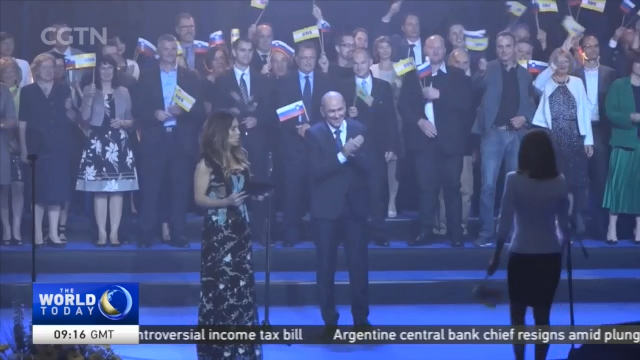
18:39, 15-Jun-2018
Slovenia Politics: Anti-immigration party's victory in polls pose political uncertainty
03:20

Meanwhile in Slovenia, recent elections have brought more political uncertainty to the eastern European country. The right-wing, anti-immigration party -- the Slovenia Democratic Party -- won most of the votes in the June 3rd general election, but it didn't have enough to form a new government on its own. Its leader, Janez Jansa, was left with the onerous task of forming a coalition, with most of the other parties refusing to enter into a partnership with them. CGTN's Aljosa Milenkovic brings us this report now from Ljubljana.
According to many -- both here in Slovenia and across the West -- this fence gave Janez Jansa's party a real helping hand in the recent general election. This section here runs along the edges of the Slovenian village, Rigonce.
ALJOSA MILENKOVIC RIGONCE, SLOVENIA "This barbwire fence was put up a couple of years ago at the height of the migrant crisis. It actually separates the two EU countries, Croatia on my left, and Slovenia. Although the peak of the crisis has since passed, many political parties here want this structure to remain in place."
During his election campaign, Jansa constantly reiterated the need to differentiate between the genuine refugees and those who were just "economic migrants".
JANEZ JANSA SLOVENIA DEMOCRATIC PARTY LEADER "During the biggest migration wave, we clearly said to our European partners and now it is at least partly the European policy, that the cause of people attempting to come to Europe to seek a better life, that better life should be provided to them back at home."
Strong support for Jansa's policies came from neighboring Hungary and its prime minister, Viktor Orban, seen here at an SDS rally.
As a consequence, many in Europe see this as the rise of the new right-wing and anti-Brussels movements on the rebellious eastern side of the EU.
But not everybody agrees with that. According to Sebastian Jeretic -- who is a political adviser for several Slovenian politicians -- Jansa won the election because his competition was weak and his economic policies were well thought-out.
SEBASTIJAN JERETIC POLITICAL ANALYST "This was not the central point. Viktor Orban support and anti-migrant program didn't gain that much. You know, he gained 40,000 votes, so he gained 4% from the last elections, and this is because the left wing was not successful in the communication."
Now it's clear that Jansa will be given the chance to form a new government. At the same time, Marjan Sarec -- who leads the second-most popular party, the LMS -- is saying all options are on the table, including another election. All options except an alliance with Jansa, even if offers his enticing concessions.
MARJAN SAREC LIST OF MARJAN SAREC PARTY LEADER "We don't need to give any ultimatums to him, because even before the election, we were saying that we wouldn't enter into a coalition with the SDS, just like a number of other parties were claiming. If we change that now, we won't be trustworthy anymore. I think that we have to stick to our pre-election promises."
The way things stand, the process to create a new government in Slovenia may take several months. Indeed, a number of analysts believe all efforts are doom to fail, and we're inevitably looking at another election later this year. Aljosa Milenkovic, CGTN, Ljubljana.

SITEMAP
Copyright © 2018 CGTN. Beijing ICP prepared NO.16065310-3
Copyright © 2018 CGTN. Beijing ICP prepared NO.16065310-3